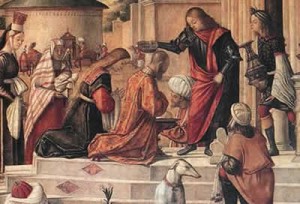Alive in The Spirit
Jesus will not leave us alone. He won’t make us children of God in Baptism only to leave us “orphans,” He assures us in today’s Gospel (see Romans 8:14-17) .
He asks the Father to give us His Spirit, to dwell with us and keep us united in the life He shares with the Father.
We see the promised gift of His Spirit being conferred in today’s First Reading.
The scene from Acts apparently depicts a primitive Confirmation rite. Philip, one of the first deacons (see Acts 6:5), proclaims the Gospel in the non-Jewish city of Samaria. The Samaritans accept the Word of God (see Acts 17:11; 1 Thessalonians 2:13) and are baptized.
It remains for the Apostles to send their representatives, Peter and John, to pray and lay hands on the newly baptized—that they might receive the Holy Spirit. This is the origin of our sacrament of Confirmation (see Acts 19:5-6), by which the grace of Baptism is completed and believers are sealed with the Spirit promised by the Lord.
We remain in this grace so long as we love Christ and keep His commandments. And strengthened in the Spirit whom Jesus said would be our Advocate, we are called to bear witness to our salvation—to the tremendous deeds that God has done for us in the name of His Son.
In today’s Psalm, we celebrate our liberation. As He changed the sea into dry land to free the captive Israelites, Christ suffered that He might lead us to God, as we hear in today’s Epistle.
This is the reason for our hope—the hope that sustains us in the face of a world that cannot accept His truth, the hope that sustains us when we are maligned and defamed for His name’s sake.
Put to death in the flesh, He was brought to life in the Spirit, Peter tells us today. And as He himself promises: “Because I live, you will live.”
Pope Benedict XVI
Homily, April 27, 2008
The First Reading, from chapter 8 of the Acts of the Apostles, tells of the mission of the deacon Philip in Samaria. I would like immediately to draw attention to the sentence that ends the first part of the text: “The rejoicing in that town rose to fever pitch” (v. 8).
This expression does not communicate an idea or a theological concept but refers to a circumstantiated event, something that changed people’s lives: in a specific city of Samaria, in the period that followed the violent persecution of the Church in Jerusalem (cf. Acts 8: 1), something happened that caused “great joy”. So what was it?
The sacred Author recounts that to escape the persecution which had been unleashed in Jerusalem against those who had converted to Christianity, all the disciples except the Apostles left the Holy City and scattered in the countryside around it. This distressing event mysteriously and providentially gave new dynamism to the spread of the Gospel. Among those who had dispersed was Philip, one of the Community’s seven deacons. …
Now, it happened that the inhabitants of the region of Samaria mentioned in this chapter of the Acts of the Apostles unanimously accepted Philip’s proclamation and, thanks to their adherence to the Gospel, he was able to heal many sick people. In that town of Samaria, in the midst of a people traditionally despised and virtually excommunicated by the Jews, the proclamation of Christ, which opened the hearts of all who accepted it, resounded. This explains why, St Luke emphasizes, “there was great joy” in that town.
Dear friends, this is also your mission: to bring the Gospel to everyone so that everyone may experience the joy of Christ and that there be joy in every city. What can be more beautiful than this? What can be greater, more exciting, than cooperating in spreading the Word of life in the world, than communicating the living water of the Holy Spirit? …
Let us return to the First Reading which offers us another element of meditation. In it is mentioned a prayer meeting which takes place precisely in the Samarian town evangelized by the deacon Philip. Presiding at it are the Apostles Peter and John, two “pillars” of the Church, who came from Jerusalem to visit this new community and strengthen it in the faith. Through the imposition of their hands, the Holy Spirit descended upon all those who had been baptized. In this episode we can see a first attestation of the rite of “Confirmation”, the second Sacrament of Christian initiation.
We … find in this Gospel passage the mysterious Trinitarian “movement” that leads the Holy Spirit and the Son to dwell in the disciples. Here, it is Jesus himself who promises that he will ask the Father to send his Spirit, defined as “another Paraclete” (Jn 14: 16), a Greek word that is equivalent to the Latin “ad-vocatus”, an advocate-defender.
The first Paraclete is in fact the Incarnate Son who came to defend man from the accuser by antonomasia, who is Satan. At the moment when Christ, his mission fulfilled, returns to the Father, he sends the Spirit as Defender and Consoler to remain with believers for ever, dwelling within them.
Thus, through the mediation of the Son and of the Holy Spirit, an intimate relationship of reciprocity is established between God the Father and the disciples: “I am in my Father, and you in me, and I in you”, Jesus says (Jn 14: 20). However, all this depends on one condition which Christ imposes clearly at the beginning: “If you love me” (Jn 14: 15), and which he repeats at the end: “He who obeys the commandments he has from me is the man who loves me; and he who loves me will be loved by my Father. I too will love him and reveal myself to him” (Jn 14: 21).
Without love for Jesus, which is expressed in the observance of his commandments, the person is excluded from the Trinitarian movement and begins to withdraw into himself, losing the ability to receive and to communicate God. …
One more observation on the Second Reading: it is taken from the First Letter of Peter, near whose tomb we find ourselves and to whose intercession I would especially like to entrust you. I make my own and consign to you with affection his words: “Venerate the Lord, that is, Christ, in your hearts. Should anyone ask you the reason for this hope of yours, be ever ready to reply (3: 15).
Worship Christ the Lord in your hearts: cultivate a personal relationship of love with him, your first and greatest love, one and totalizing, in which to live, purify, illumine and sanctify all your other relationships. The “hope that is in you” is linked to this “adoration”, to this love of Christ, who through the Spirit, as we said, dwells within us. Our hope, your hope is God, in Jesus and in the Spirit.
Pope Benedict XVI
Regina Caeli, May 29, 2011
The book of the Acts of the Apostles states that after a first violent persecution, the Christian community of Jerusalem, except for the Apostles, spread to the surrounding areas. Philip, one of the deacons, arrived in a city of Samaria. There he preached the Risen Christ, and his proclamation was supported by numerous healings, so that the outcome of the episode was very positive: “there was much joy in that city” (Acts 8:8).
We are repeatedly impressed in a profound way by this expression, which in essence communicates a sense of hope, as if saying: It is possible! It is possible for humanity to know true joy, because wherever the Gospel comes, life flourishes, just as arid ground, irrigated by rain, immediately turns back to green.
With the strength of the Holy Spirit, Philip and the other disciples accomplished in the villages of Palestine what Jesus had done: They preached the Good News and worked miraculous signs. It was the Lord who acted through them. As Jesus proclaimed the coming of the Kingdom of God, so the disciples proclaimed the Risen Jesus, professing that he is the Christ, the Son of God, baptizing in his name and driving out every illness of body and spirit.
“There was much joy in that city”. Reading this passage, one thinks spontaneously of the healing power of the Gospel, which throughout the centuries has “watered” so many populations, like a beneficent river. Several great men and women saints brought hope and peace to entire cities — we think of Charles Borromeo in Milan at the time of the plague, of Bl. Mother Teresa of Calcutta, and of so many missionaries, whose names are known by God, who have given their lives to bring the proclamation of Christ and make profound joy flower among men.
While the powers of this world sought to conquer new territories for political and economic interests, Christ’s messengers went everywhere with the aim of bringing Christ to men and men to Christ, knowing that he alone can give true freedom and eternal life. Today too the Church’s vocation is evangelization: whether it be to populations which have not yet been “irrigated” by the living water of the Gospel, or to those that, though having ancient Christian roots, are in need of new nourishment to bear new fruit and rediscover the beauty and joy of the faith.
Latin Liturgy
The Pentecost Sequence: Come Holy Spirit
Holy Spirit, Lord divine,
Come from heights of heav’n and shine,
Come with blessed radiance bright.
O consoler, wisest, best,
And our soul’s most welcome guest,
Sweet refreshment, sweet repose.
In our labor rest most sweet,
Pleasant coolness in the heat,
Consolation in our woes.
Light most blessed, shine with grace
In our heart’s most secret place,
Fill your faithful through and through.
Left without your presence here,
Life itself would disappear,
Nothing thrives apart from you!
Cleanse our soiled hearts of sin,
Arid souls refresh within,
Wounded lives to health restore.
Bend the stubborn heart and will,
Melt the frozen, warm the chill,
Guide the wayward home once more!
On the faithful who are true
And profess their faith in you,
In your sev’nfold gift descend!
Give us virtue’s sure reward,
Give us your salvation, Lord,
Give us joys that never end!

